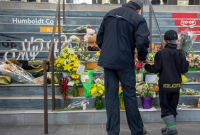Support strong Canadian climate journalism for 2025
The recent tragic bus crash that took the lives of 16 people travelling with the Humboldt Broncos has rightfully shaken many Canadians.
Popular folklore would present us as a “hockey nation," one where our national sport forges bonds that transcend provincial and territorial borders, race, or even class. The outpouring of support towards the bereaved is understandable and historic. Parents who see their children off on buses en route to sporting events expect them to return home safely. This truth is a major factor behind the collective sympathy offered to the prairie families that have had their lives forever shattered by a deadly collision at a dangerous country road intersection.
It is not, however, the sole factor. As Quebec City writer and organizer Nora Loreto pointed out on Twitter Sunday evening, “the maleness, the youthfulness and the whiteness of the victims are… playing a significant role. I don’t want less for the families and survivors of this tragedy. I want justice and more for so many other grieving parents and communities.”
Loreto’s tweets were a response to news that a GoFundMe for the families of the victims had raised four million dollars after having started off a few hours earlier with a $10,000 goal. That number has since risen to over eight million dollars, making it the most successful GoFundMe campaign in Canadian history. Her tweets have since garnered a flood of furious public and private responses, including death threats and wishes of bodily harm.
It has solicited the ire of Ontario Proud and of Jason Kenney, the leader of the United Conservative Party in Alberta. Others have set out on a mission to get her fired, despite the fact that she is self-employed.
Many accuse Loreto of attempting to be “edgy” in order to garner greater notoriety as a writer and commentator. But is her analysis that extreme? Loreto’s tweet does not diminish or besmirch the memory of the victims of the Humboldt Broncos bus crash. It simply raises some important questions.
Namely, why do we rally more around certain communities in times of tragedy as opposed to others?
Can we genuinely imagine that a hypothetical tragedy involving racialized teenagers returning home from a badminton tournament or some other sporting event less esteemed in our national consciousness would have received a similar treatment? It certainly would garner sympathy, and people would very likely talk about it for a day or two around the water cooler at work, but do we believe over 100,000 people would have raised over eight million dollars for them in four days? Frankly, I’m not even so sure a team of young Northern Indigenous hockey players would. When 10 migrant workers were killed in a bus accident in rural southern Ontario in 2012, there was no national campaign, no fundraiser, and the three survivors had to fight to be able to stay in Canada.
The Humboldt Broncos crash is heartbreaking and the families and survivors absolutely deserve support.
But the outpouring of sympathy they've received in Canada isn't always present in other tragedies. The crowdfunding campaign for the family of Pierre Coriolan, a black man killed by Montréal police, has reached less than 50 per cent of its $20,000 goal to help the family cover the legal costs of seeking justice for their loved one. What of the 32 seniors who perished in the 2014 L’Isle-Verte nursing home fire? Not to mention the families of over a thousand missing and murdered Indigenous women and girls.
Do people fear that admitting there is some truth to Loreto’s claim about unequal treatment do tragedies may make them “a racist,” as though racism were a binary and not a spectrum?
Is it beyond the scope of possibility that part of the answer is the identity of the victims and how it consciously or subconsciously influences our feelings and actions? What does it say about our country that such reflections are met with (often male) violence and rage?
What will it take for us to be able to express such concerns without fear of being attacked and harassed by a legion of regressive, “I don’t see colour” patriotic Canadian chest-thumpers? What can we do to make acts of solidarity the norm in these situations of mourning, and not solely a gift reserved for traditionally whiter Canadian communities?
Let me conclude by being as explicit as Loreto was: the survivors and victims of this crash deserve every ounce of compassion and solidarity they have received. May other grieving families and communities one day be supported as strongly in times of struggle, or at the very least, seen.






Comments
Yes, the discourse on such matters is loaded with high emotion. I completely agree with both Nora and Mathieu. However, in life timing is everything. This timing guarantees high visibility for the comments BUT it also is very bad timing for everyone who is grieving personal loss in Humboldt and collective loss across Canada. On balance, it would have perhaps been wiser to wait a while to write these words. Grieving people, like angry people, don't think straight. Now we have a situation where these same people are grieving and angry. The discussion about a double standard needs to be had but now was not the best time to do so.
I have to disagree with your thoughts on timing. In a couple of months, this will be a non issue for most Canadians, and by then, few will read or reflect on Nora's post.
She has done us a great service, by bringing out into the open the double edged sword of our reaction to death. On the one hand we grieve, on the other we threaten folks with death??? We need to look at this, because the fact is: Death threats don't come from a place of empathy. Or grief.
Bullies don't feel grief...not really. So everyone attacking Nora, isn't who they'd like us to believe they are, when participating in a national orgy of togetherness. It's kind of important to be up front about that.
Thanks for this article...and for filling me in on something I'd have missed without the National Observer.
A friend reported making a similar comment at church, and receiving the glares of all present...so the Age of Denial isn't just about Climate Change.
Traditionally privileged white people are having a hard time waking up to all kinds of unpleasant realities. Unfortunately, the MSM generally helps keep them sleep walking....and it is time that we had the difficult discussions that sentiment and other 'easy emotions' generally brush under the rug.
I'll begin by saying, these national outpourings of grief and weeks of national obsession have always slightly sickened me. I cried listening to the father of the young player with the cheek birthmark...but I do not remember the boys name. Every time I think of that dad, I feel proud and devastated. I doubt I'd make as moving a tribute to my boy, were I to lose him in this tragic way, and I can well imagine the months and years ahead for that family....but I won't be there to witness, let alone feel that loss.
However, my ability to feel empathy isn't restricted to my tribe...and I somehow suspect that when it is, it may not be empathy in the way I experience it. Sometimes we fasten on other people's tragedy, as a way of venting feelings our culture forbids normally. Sometimes we can project our fears and our sorrows onto the national symbol du jour....and the more like us those folks are, the easier is the transfer of emotion.
Which may be why so many crocodile tears convert easily to death threats. Perhaps under the emotional carnival lurks something less likeable, but also mostly kept hidden.
Anger, rage, hatred.....a lifetime of need to express feelings even more forbidden than grief.
The slightest criticism, the merest suggestion that we aren't the good people a national mourn fest makes us believe we are, and out come the clubs and assault rifles.
And as long as the need to use violence against others is as strong as our need to weep together, you bet there's racism. Folks of European extraction should get over themselves. When they do, they'll see clearly that the playing field in our country is anything but level. Perhaps they'll even have honest discussions about racism, sexual violence, and toxic male rage.
And when they do, the regret, sorrow, grief won't diminish. It may well become more authentic..and given to action more lasting than throwing money.
This is a very thoughtful comment, thanks.
"What does it say about our country that such reflections are met with (often male) violence and rage?" Even if the voices aren't all male, there will be female voices to join in defense of their beloved, beleagured males. It's a phenomena that occurs when we are challenged as a society with change. Of course we want to defend our males whom we love, but it takes an extra step in self-awareness to understand truth when it smacks us in the face. Thank you Mathieu for bringing Nora Loreto's words to my attention; she is surely entitled to her opinion in our democratic country without fear of violent repercussion, and I agree with the conclusion both you and Loreto came to: "the survivors and victims of this crash deserve every ounce of compassion and solidarity they have received. May other grieving families and communities one day be supported as strongly in times of struggle, or at the very least, seen."
"Ogies of grief" - whether for Hockey players or Princesses are generally, outlets for a flood of some fairly ignoble human emotions. Responses, collective or individual, ranging from fear to rage regularly underlie the grief. When our daily lives are upended by some unexpected, catastrophic event we become unbalanced, irrational and too often seeking someone, something to blame for the emotional turmoil.
The Male? trolls? who abused Ms. Loreto, often represent people who have no equipment to handle strong emotions - except with anger or violence. This is a common failure in the socializing of children - especially males - whom we discrourage, from birth, for their expressions of any emotion that signals "weakness".